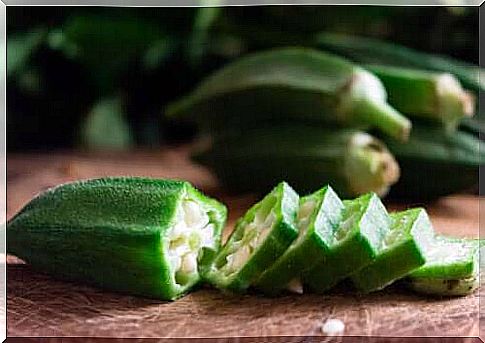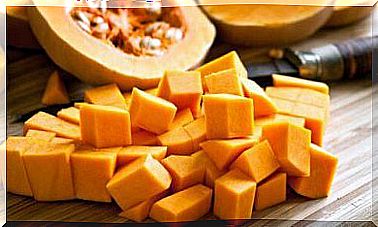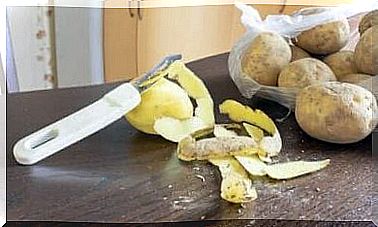Okra Or “Women’s Fingers”: Features, Uses And Benefits

Okra, or women’s fingers, is a fruit used in gastronomy as a vegetable. Originally from Africa, it belongs to the cotton and hibiscus family.
Although the cultivation of okra has been lost in the pages of history, it has spread to Asia, America and the United States. This fruit is a pod similar to the paprika, but has elongated stripes. If you cut it, the slices get a star shape.
Okra also goes by the names bamia, bhindi, gombo and many others. It is very versatile in the kitchen in its raw or cooked form. However, the mucus gives it a slimy consistency that is unattractive to some consumers. So it is often best in stews, such as the popular gumbo in New Orleans, which has African roots mixed with French and Spanish origins.
Nutritional values
The North Carolina Department of Agriculture describes the nutritional composition of a 3 ounce serving of okra or female fingers. The energy intake is only 33 calories, as it is 90% water and only 7% carbohydrates. Soluble fiber dominates, which the body does not digest.
It contains 21 milligrams of vitamin C, which covers 26% of the recommended daily intake. It provides 53 micrograms of vitamin K and 26% of the recommended daily intake.
As highlighted by Nutrients magazine, science recognizes vitamin C as a powerful antioxidant and for participating in immune function. While the magazine Open Heart comments on the role of vitamin K in blood coagulation.
Therefore, experts recommend eating okra in raw form to take full advantage of the vitamin C content. This is because , as Chilean Nutrition Magazine refers, heat destroys it. Magnesium, vitamins A and B6 that okra contains, cover 14% of our daily needs, and the fruit covers 15% of our folic acid needs.
Although the protein level is only 2%, it is higher than for other fruits and vegetables. A review highlights that protein consumption has an effect on weight control and muscle mass synthesis.
Possible benefits of okra or lady fingers
Okra provides a number of health benefits due to the presence of antioxidant components, such as polyphenols. It also has soluble fiber and lectin. Below we will tell you more.
1. It is a source of antioxidants
Okra is a fruit that contains many antioxidants, which some experts describe as compounds that block the damage caused by free radicals.
The journal Nutrients has confirmed the antioxidant effect of polyphenols and flavonoids such as isoquercetin in okra. A review in this regard related the protective role of polyphenols against cardiovascular disease in human intervention studies, animal models and laboratory studies.
Other experts have also found the positive effect of polyphenols in preventing brain aging and its positive effects on cognitive functions, learning and memory.

Also read: Antioxidants for relieving gout
2. Okra can be beneficial for diabetes
Medical studies on the treatment of diabetes with okra consumption are still in the early stages of research. Some of them indicate that okra water can improve blood sugar levels in pregnant rats with gestational diabetes.
At the same time, science has also shown the effect of roasted okra seeds on blood sugar. Therefore, it is part of the treatment of diabetes in Turkey.
High levels of fiber are important when it comes to dieting for diabetes. Studies show that fiber intake can promote better glycemic control and increase insulin sensitivity. Okra contains 7% soluble fiber.
3. It reduces the risk of cardiovascular disease
The Secretariat of the Agro-Industry of Buenos Aires published that the predominant fiber in okra is of the soluble type, through the mucus which gives it the special tackiness when raw. Therefore, it acts as a thickener in culinary preparations.
This mucus can bind to cholesterol during digestion and excrete it through the stool instead of absorbing it in the intestine. This helps to clean the arteries and reduce the risk of heart attack or heart disease.
In a study evaluating the ability of okra to lower blood lipids, the experiments involved 3 groups of mice: one on a high-fat diet without okra, and the other two on the same diet with 1% or 2% okra powder supplements.
They found that the group that took okra powder supplements eliminated more cholesterol in their stools. The mucosa showed strong binding to bile acids at the laboratory level. This may contribute to its potential use in the treatment of high cholesterol.
Another contribution from okra regarding heart disease has to do with the high polyphenol content. In this connection, a long-term study of 1139 people showed that those who ate diets rich in polyphenols had lower levels of inflammatory markers.
4. It fights exhaustion
Consumption of okra can lead to faster recovery after exercise. This is demonstrated by a study on improving recovery times and fatigue when using this fruit.
5. Okra can have anti-cancer effects
Lectin is a type of protein found in some vegetables, including okra. It can inhibit the growth of cancer cells.
In this connection, a laboratory study on breast cancer cells found that the lectin in okra can prevent the growth of malignant cells by 63%. In metastatic mice, they also found that energy extract caused cell death in melanoma cancer cells.
Despite these favorable results, it should be noted that these studies were performed at laboratory level without use in humans. More research is needed to get definitive evidence.
6. Okra can help with pregnancy
One serving of okra covers 15% of the needs for folic acid or vitamin B9. This vitamin is essential in pregnant women and helps reduce the risk of neural tube defects. According to recommendations, pregnant women should consume up to 400 micrograms of folic acid per day.
Potential risk and contraindications when using okra
Caution should be exercised when consuming okra during treatment of any diseases. For example, in diabetes, a study shows that it should not be combined with metformin, as it may interfere with absorption. Diabetic patients should inform their doctor if they are looking for alternative treatments with this fruit.
Other precautions to consider are that it contains high levels of oxalates, which turn into kidney and gallstones. When preparing it, you should also take some precautions, because the surface has a kind of very small hairs that can be irritating to the stomach and skin.

How to use okra
Okra is very versatile in the kitchen. It can be prepared raw for salads or dried to enhance the taste.
Since the mucus it contains causes a certain distaste among consumers, it is a good way to use it in the form of stews due to its thickening power. You can also fry it.
In addition, it combines very well with other vegetables, such as coriander, tomato, paprika and parsley to cook meat or fish. In pickled sauce, it is an excellent alternative to replace the bitterness in the pod with a sour taste. Just put garlic, peas and black pepper on the bottom and okra pods on top, in repeated layers. Then add sugar, salt and vinegar.
Overall, okra is a food that provides benefits for the heart, brain and pregnancy. So, apart from some precautions you need to take into consideration, it can be part of a healthier diet.









